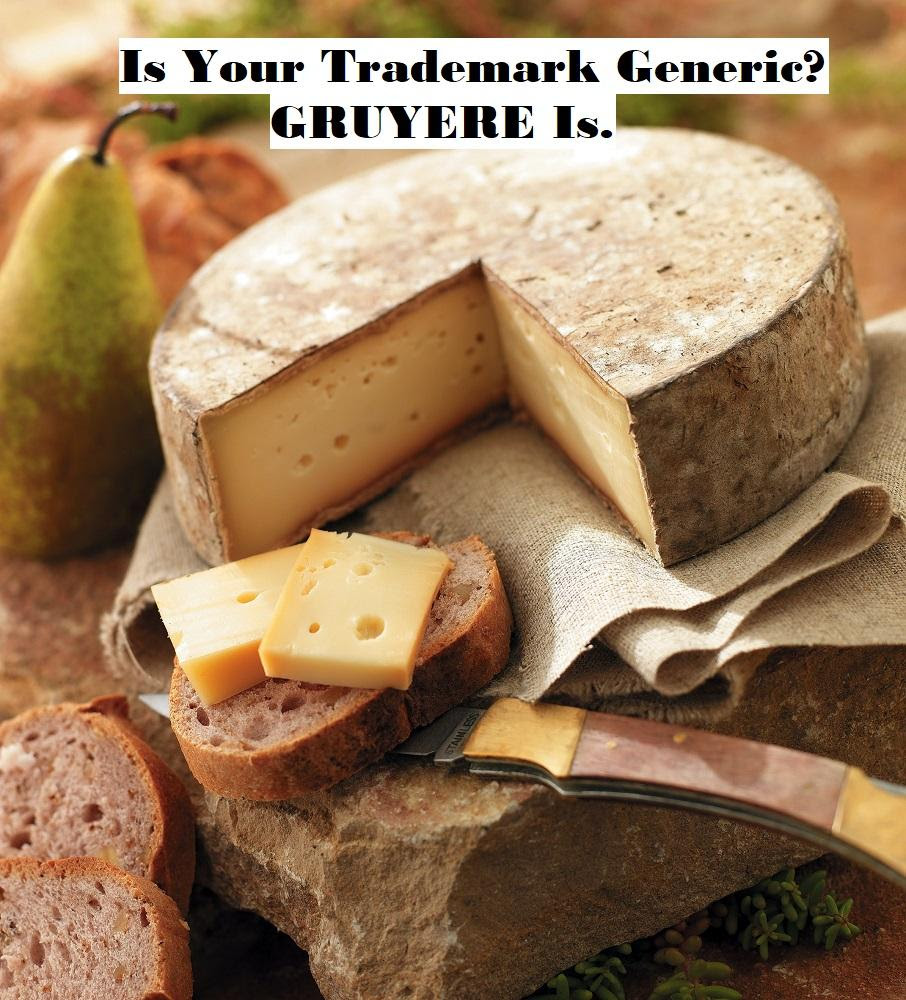Gruyère cheese has been made in Switzerland since 1115 and in France for hundreds of years. Several years ago, Swiss and French industry groups filed an application with the US Patent and Trademark Office to register GRUYERE (no accent mark) as a certification mark for cheese originating in the Gruyère region of Switzerland and France.
Switzerland and the EU have listed GRUYÈRE as a protected designation of origin; France has listed it as a protected geographical indicator. Simply stated, this means that France, Switzerland, and the EU have said the term GRUYÈRE serves as a guarantee that the cheese originates from somewhere in the Gruyère region.
Four oppositions were filed against the trademark application, arguing, among other things, that the mark is generic. After reviewing all of the presented evidence, the TTAB found that purchasers and consumers of cheese understand GRUYERE to primarily refer to a certain type of cheese “that can come from anywhere.”
The cheesemaking consortiums appealed the TTAB’s ruling that the mark is generic, but the US District Court for the Eastern District of Virginia agreed with the TTAB, holding that:
Although the term GRUYERE may once have been understood to indicate an area of cheese production, the factual record makes it abundantly clear that the term GRUYERE has now, over time, become generic to cheese purchasers in the United States.
To be protectable, a trademark must be “distinctive.” This means it must be used to identify the source of the product or service.
Courts classify marks into categories of distinctiveness. The most distinctive marks are those that are arbitrary or fanciful. Examples include EXXON for gasoline and APPLE for electronics.
Suggestive marks, those that require some imagination to determine the nature of the goods or services, are also protectable. An example is MUSTANG for fast cars.
A descriptive mark receives trademark protection only if the mark’s owner can prove that the mark has acquired “secondary meaning” in the minds of the relevant public. In other words, consumers must associate the mark with a unique source and think of the term as a brand name rather than as a description.
For example, TV GUIDE is descriptive of a guide to TV programs, but because of its extensive advertising, promotion and public recognition, this mark has achieved secondary meaning and is protectable.
A generic term is the name for a general class of product or service. Take, for example, a shoe manufacturer with a line of sandals branded as SANDALS. When consumers see that term, they’ll think of open shoes with straps from any manufacturer, not just your brand. Generic terms receive no trademark protection.
In the GRUYERE dispute, those opposing registration of the mark presented evidence that GRUYERE is generic, including:
• the Food and Drug Administration’s regulations, which recognize that a cheese can be labeled GRUYERE regardless of where the cheese is produced;
• USDA statistics showing that a large amount of cheese produced outside of the Gruyère region of Switzerland and France is imported into the United States and sold in the US labeled as GRUYERE;
• evidence that a large amount of cheese produced in the US is sold to US cheese purchasers labeled as GRUYERE; and
• evidence of common usage of the term “gruyere,” including reference materials, media coverage, and industry practice.
The court concluded:
In summary, the undisputed evidence produced by the parties in this case makes clear that the primary significance of the term GRUYERE, as understood by the relevant purchasing public in the United States, is a generic term for a type of cheese and does not refer solely to cheese from a specific geographic region. Thus, the term GRUYERE, through the process of genericide, has become generic and is ineligible for registration as a certification mark. It is clear from the record that the term GRUYERE may have in the past referred exclusively to cheese from Switzerland and France. However, decades of importation, production, and sale of cheese labeled GRUYERE produced outside the Gruyère region of Switzerland and France have eroded the meaning of that term and rendered it generic.
This decision is a good reminder of the importance not only of choosing a good trademark, but also of properly policing your marks.
Please feel free to contact us if you have any questions about or need help with choosing, protecting, or enforcing your trademarks.
Photo by mohamed hassouna on Unsplash






